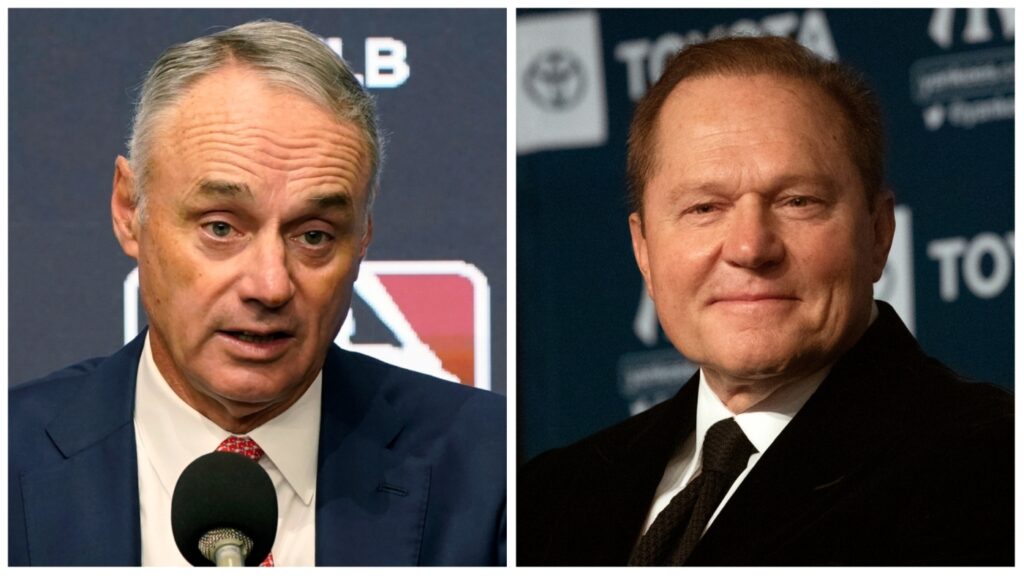
SAN DIEGO — At baseball’s first post-pandemic Winter Meetings, it’s just like the old days. The multi-year and multi-hundred million dollar contracts are announced, the commissioner talks about economic imbalance and the game’s uber-agent scoffs at such talk.
Good times. (Especially if you’ve either gotten paid or are about to be.)
Things got off to a rollicking start on Monday with Trea Turner’s 11-year, $300 million contract with the Phillies, though maybe not so rollicking for the Dodgers. (And if you remember Phillies owner John Middleton talking a few years ago about how it might be necessary to spend stupidly to enable his team to change course, feel free to send me your punchlines.)
That deal, along with Justin Verlander’s two years (with an option for a third) at $86.6 million from the New York Mets, got things rolling. As Tuesday unfolded, the baseball world was waiting on Aaron Judge’s decision and the potential destinations of free agent shortstops Dansby Swanson, Xander Bogaerts and Carlos Correa.
Good for the sport, or bad for the sport? Your response likely depends on whether your favorite team considered itself in position to do any of that bidding.
Commissioner Rob Manfred, speaking to members of the Baseball Writers’ Association of America on Tuesday morning, either really isn’t sure or was hedging his bets.
“The free agent market’s going to be what it is, right?” he said. “It’s the product of a whole bunch of economic forces and individual decisions by clubs as to what they want to do.
“On the positive side, I think, a week in December where there’s a ton of focus on players and where they’re going to be is a good thing in terms of marketing the game. And on the downside, I think everyone in this room understands that we have a level of revenue disparity in this sport that makes it impossible for some of our markets to compete. It’s some of the numbers we’ve seen. And, you know, that’s not a positive, just it’s like everything else in life, there’s good and bad.”
We interrupt for a news flash: Cleveland had the 27th-highest Opening Day payroll among the 30 teams, and the Guardians won their division and a playoff series and took the New York Yankees to six games in an American League Division Series.
So remind me again about the purpose of the 99-day management-driven lockout that (A) wiped out last year’s Winter Meetings, (B) prevented any teams from making any moves or injured players from rehabbing under the guidance of their clubs from last Dec. 1 through March 10, and (C) forced a delayed schedule that, along with the addition of an extra playoff round, pushed the World Series five days into November.
If nothing substantive was going to change with the game’s economics, as apparently nothing really has, couldn’t all of that have been avoided?
Scott Boras is still baseball’s kingmaker. And the game’s most powerful agent held his traditional Winter Meetings news conference on Tuesday, which happened to be just after Manfred’s session with the writers. The commissioner got a conference room. The agent set up in an alcove off the lobby of the Manchester Grand Hyatt, since there was no way he’d be allowed to use an MLB-branded interview room.
Boras was taking a break from fielding inquiries about Judge, shortstops Bogaerts and Correa and outfielders Brandon Nimmo, Cody Bellinger and Joey Gallo, among others. And in between his customary bad puns and pitches for his own guys’ importance as pieces of winning teams, he provided this analogy:
“We tend to describe the free-agent market like pools. Gotta have an infinity pool, a lap pool, kind of a lazy river pool. Then you have the play pool. I would say that the Yankees are in the infinity pool, seeking great players. …
“We’ve seen a market adjustment for the revenues, the great revenues of the game, where we’re at, what we’re doing. And the owners, and certainly their general managers are buzzing the economic tower to help them get their job done.”
Related Articles
Angels hope to get a few more starts out of Shohei Ohtani in 2023
Cody Bellinger, Cubs reportedly agree to $17.5M, 1-year deal
Angels’ Mike Trout opened the floodgates by committing to Team USA
Commissioner Rob Manfred says potential Angels owners are examining financial data
Angels add Carlos Estevez to bullpen with 2-year, $13.5M deal
There is, of course, that great middle class of free agents – you know, the ones who got the short end in the last previous labor contract, particularly those over-30 players who have found themselves signing one-year deals or minor league contracts. We will know by spring training whether they made out better in this one.
In the meantime, we will note that Manfred’s remarks at the top of his address to the BBWAA emphasized not only the successes and excitement on the field in 2022 but postseason TV ratings (even when head-to-head with the NFL), and particularly ratings bumps in the 14-to-17 and 18-to-34 demographics. Maybe young people are more interested in the sport than common wisdom would have you believe.
But in answering a question about MLB’s recent sale of its remaining 15% share of the BAMTech streaming platform to Disney for $900 million, the commissioner made this observation of how the clubs will spend their shares of that windfall:
“It’s an individual club decision as to whether they want to take that money and put it into player payroll or they want to reduce debt. There’s been a couple of tranches of BAMtech payments to the clubs. It was a mixed bag. You know, clubs did different things, and I expect that will sort of be the same this time around.”
The ultimate takeaway, then: It’s not the players’ responsibility to prop up teams who choose not to spend on payroll. And at this time of year, it’s pretty evident who they are.
